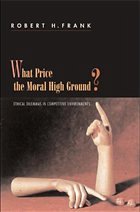Nicht lieferbar

What Price the Moral High Ground?
Ethical Dilemmas in Competitive Environments
Versandkostenfrei!
Nicht lieferbar
Many observers interpret the recent wave of corporate scandals as support for the cynical view that self-interest trumps concerns for the greater good. Indeed, this interpretation finds comfort in the intellectual traditions of fields from mainstream economics to evolutionary biology. But is it valid?In What Price the Moral High Ground?, economist and social critic Robert Frank challenges the notion that doing well is accomplished only at the expense of doing good. Frank explores exciting new work in economics, psychology, and biology to argue that honest individuals often succeed, even in hig...
Many observers interpret the recent wave of corporate scandals as support for the cynical view that self-interest trumps concerns for the greater good. Indeed, this interpretation finds comfort in the intellectual traditions of fields from mainstream economics to evolutionary biology. But is it valid?
In What Price the Moral High Ground?, economist and social critic Robert Frank challenges the notion that doing well is accomplished only at the expense of doing good. Frank explores exciting new work in economics, psychology, and biology to argue that honest individuals often succeed, even in highly competitive environments, because their commitment to principle makes them more attractive as trading partners.
Drawing on research he has conducted and published over the past decade, Frank challenges the familiar homo economicus stereotype by describing how people create bonds that sustain cooperation in one-shot prisoner's dilemmas. He goes on to describe how people often choose modestly paid positions in the public and nonprofit sectors over comparable, higher-paying jobs in the for-profit sector; how studying economics appears to inhibit cooperation; how social norms often deter opportunistic behavior; how a given charitable organization manages to appeal to donors with seemingly incompatible motives; how concerns about status and fairness affect salaries in organizations; and how socially responsible firms often prosper despite the higher costs associated with their business practices.
Frank's arguments have important implications for the conduct of leaders in private as well as public life. For, as he concludes, the better we understand personal motivation in competitive environments, the better we can structure organizations and public policies to promote our true ends.
Endorsements:
"I loved this book. It makes sense of key economic behaviors not well explained by other models, through a combination of theory, examples, and clever experiments. Clearly written, it will be easily understood not only by economists but also noneconomists. Vintage Frank."--Shlomo Maital, author of Executive Economics
"Robert Frank takes us beyond the economic notion of rationality, pointing to the norms that guide people, their social status, and character, and make them seem nicer than economic theory would have them be. He adds an interesting twist to the story by showing that those who are subjected to theory may actually be less nice, less cooperative than others."--Arjo Klamer, editor of Conversations with Economists and The Value of Culture
In What Price the Moral High Ground?, economist and social critic Robert Frank challenges the notion that doing well is accomplished only at the expense of doing good. Frank explores exciting new work in economics, psychology, and biology to argue that honest individuals often succeed, even in highly competitive environments, because their commitment to principle makes them more attractive as trading partners.
Drawing on research he has conducted and published over the past decade, Frank challenges the familiar homo economicus stereotype by describing how people create bonds that sustain cooperation in one-shot prisoner's dilemmas. He goes on to describe how people often choose modestly paid positions in the public and nonprofit sectors over comparable, higher-paying jobs in the for-profit sector; how studying economics appears to inhibit cooperation; how social norms often deter opportunistic behavior; how a given charitable organization manages to appeal to donors with seemingly incompatible motives; how concerns about status and fairness affect salaries in organizations; and how socially responsible firms often prosper despite the higher costs associated with their business practices.
Frank's arguments have important implications for the conduct of leaders in private as well as public life. For, as he concludes, the better we understand personal motivation in competitive environments, the better we can structure organizations and public policies to promote our true ends.
Endorsements:
"I loved this book. It makes sense of key economic behaviors not well explained by other models, through a combination of theory, examples, and clever experiments. Clearly written, it will be easily understood not only by economists but also noneconomists. Vintage Frank."--Shlomo Maital, author of Executive Economics
"Robert Frank takes us beyond the economic notion of rationality, pointing to the norms that guide people, their social status, and character, and make them seem nicer than economic theory would have them be. He adds an interesting twist to the story by showing that those who are subjected to theory may actually be less nice, less cooperative than others."--Arjo Klamer, editor of Conversations with Economists and The Value of Culture




